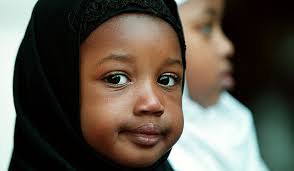A Lagos High Court is expected to rule Friday on whether a Muslim girl child could wear hijab (headscarf) in public schools, in a watershed legal case that has pitted the Muslim community in Nigeria’s commercial capital against local authorities in recent months.
The ruling had been due to be issued on September 26, but Justice Grace Modupe Onyeabor decided to adjourn the verdict until October 17.
Lagos education authorities has banned Muslim girls from wearing hijab, arguing that the outfit “was not part of the approved uniform’ for public schools.
The ban, however, was challenged at court by the Muslim Students Society of Nigeria (MSSN).
Efforts to settle the case out of court, essentially at the request of the government, have failed partly because both sides could not reach a compromise.
“Hijab is Allah’s injunction as stated in the Holy Quran, as well as a fundamental right as fully established in the Constitution of the Federal Republic of Nigeria,” Muslim lawyer Adetola Kassim had told the court during the months-long trial.
“We are not demanding for a full lent hijab. We have exhibited a photograph of a sample of hijab, which still represents their school identity. The color of the hijab can conform to the school uniform,” he said.
“All we want is for the students to be allowed to use hijab. If beret and caps are allowed for female students, hijab shouldn’t be an exemption,” Kassim said.
The legal case was also provoked following the flogging of some Muslim pupils allegedly for donning the headscarf within school premises.
Lagos MSSN president Kaamil Kalejaiye said the ban of hijab by Lagos authorities was a violation of the Nigerian Constitution, which permits freedom to practice any religion and exhibit same.
“We cannot tolerate to see our Muslimahs dress-naked. Hijab is an apparel of honor, a garment of modesty and a shield against immorality, it is our constitutional right. It is our pride. It is our dignity,” he told Anadolu Agency.
“Nigeria’s constitution grants Freedom of Religion, Conscience and Expression. It states clearly the rights to wear anything one feels comfortable with, so far as it is neither provocative nor irresponsible,” he said.
“We are neither seeking for a favor nor asking for a privilege. We are simply demanding our rights. It is important to note here that hijab has been granted by Muslim minority states, how much more Lagos State with Muslim majority,” he said.
The controversy over hijab has become a political issue.
Muslims in Nigeria’s commercial capital Lagos have recently launched a ‘no hijab, no vote’ slogan ahead the country’s 2015 polls in the state where religion of candidates may determine its outcome.
“The slogan of Muslims for Lagos 2015 is ‘No Hijab, No Vote’. Hijab here is a symbol of respect for the way of life of Muslims and a commitment by politicians to accept the legitimate demands of Muslims,” Prof Ishaq Akintola, director of Muslim Rights Concern (MURIC), told a press briefing attended by many other influential Muslim groups last month.
“These demands will be tabled before candidates when they meet leaders of Islamic organizations,” he said.
Apart from the current case, a number of legal challenges over hijab are pending in courts across Nigeria’s southwestern region.
Two women nurses who were recently sacked partly for wearing hijab are also in court to seek redress.

Oct172014
